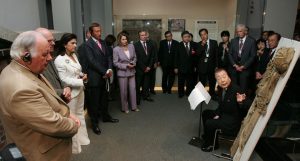Documenting Hiroshima 80 years after the A-bombing: On September 2, 2008, G8 Summit of Lower House Speakers held
May 25, 2025
Akihiro Takahashi, former director of the Peace Memorial Museum, recounted his experiences
by Michio Shimotaka, Staff Writer
On September 2, 2008, Akihiro Takahashi, then 77 and a resident of Hiroshima’s Nishi Ward, recounted the disastrous scenes caused by the atomic bombing 63 years earlier. He spoke while seated on a corner of the Peace Memorial Museum in Naka Ward, where items left behind by atomic bomb victims were on display. Facing him were Speakers who had come to Hiroshima as Lower House Speakers from the Group of Eight nations (G8 Summit of Lower House Speakers), including nuclear superpowers such as the United States and Russia, as well as other nuclear weapon states, like the United Kingdom and France.
He had initially been of two minds about whether to accept the task
His wife, Fumie, 88, a resident of Nishi Ward, revealed that he had initially been of two minds about whether to accept the task, as the time given to him was short. She said, “He was someone who rarely spoke at home about what had happened outside, but on that occasion, he may have felt he couldn’t take on such a responsibility himself.”
When Mr. Takahashi was a second-year student at Hiroshima Municipal Middle School (present-day Motomachi High School), he was exposed to the A-bombing on the school grounds, about 1.4 kilometers from the hypocenter. He lost the friends with whom he had fled through the flames. In addition to working as a municipal staff member, he also took part in the A-bomb survivors’ movement. At the first World Conference against Atomic and Hydrogen Bombs held in Hiroshima in 1955, he spoke on behalf of the A-bomb survivors of Hiroshima, a speech later introduced in a Chugoku Shimbun serial published on March 16. He served as director of the Peace Memorial Museum for four years starting in 1979, and after retiring, continued sharing his experiences of the A-bombing with students who visited Hiroshima on school trips.
Lower House Speaker Yohei Kono requested the Hiroshima municipal government host the G8 Summit of Lower House Speakers. Nancy Pelosi, the Speaker of the House of Representatives of the U.S., was the official third in line to the presidency: if the president and the vice president are unable to perform their duties, the Speaker of the House becomes the head of state. At the time, she was the highest-ranking official ever to visit Hiroshima from the nation that had dropped atomic bombs.
This was the best opportunity to make a direct appeal to a leading figure of a nuclear weapon state. Since Fumie herself had not been exposed to the A-bombing, she rarely involved herself in her husband’s activities. But on this occasion, she said, “Why don’t you talk about your friends? It’s better than saying nothing.”
While speaking about his experiences to the Speakers, he placed the tattered uniforms left behind by his classmates beside him and showed paintings depicting the devastation. He said, “I absolutely hate the A-bombing, but hatred can’t be eliminated by hatred,” and he urged the U.S. and Russia to demonstrate a strong commitment to abolishing nuclear weapons to the world.
All the Speakers together laid flowers at the Cenotaph for the A-bomb Victims
After listening to his experiences, Pelosi said, “Mr. Takahashi is beautiful.” The Speakers wrote down their impressions of the visit. Russian State Duma Speaker Boris Gryzlov said the international community should further intensify collaborative efforts to further strengthen the non-proliferation regime for weapons of mass destruction, like nuclear weapons, and aim for consistent and drastic reductions. Before visiting the museum, the Speakers together laid flowers at the Cenotaph for the A-bomb Victims and all of them held hands in front of it.
Fumie said, “When my husband came home, he looked excited. He seemed to think he had received a favorable response from the Speakers.” At the G8 Summit, the Speakers discussed the theme “The Role of Parliaments for Peace and Disarmament” in sessions closed to the public. At a news conference marking the conclusion of the summit, Speaker Kono said, “We heard encouraging remarks about disarmament and the abolition of nuclear weapons.”
Two months later, in November 2008, Barack Obama, who had been willing to abolish nuclear weapons, won the U.S. presidential election. After Obama’s inauguration in January 2009, Mr. Takahashi wrote to him four times, urging him to visit Hiroshima and to pursue the abolition of nuclear weapons. He passed away from heart failure in November 2011, before seeing his wish fulfilled. His willingness to share his experiences never wavered. Even the day before he passed away, he practiced saying, “a, i, u, e, o, ka, ki, ku, ke, ko” in his hospital room.
(Originally published on May 25, 2025)








